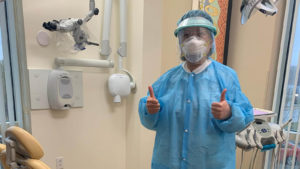Huntington’s Disease is a devastating genetic mutation of the fourth chromosome that is responsible for degenerating one’s cognitive and motor abilities over time. The typical onset of disease is around age 40, and progresses over the next 10-20 years with a fatal outcome.
Huntington’s disease is broken up into 3 stages, early, middle and late. The signs and symptoms can vary among individuals, though as the disease progresses the symptoms worsen and can include difficulty swallowing, articulating words, general weakness, involuntary or spastic movements as well and hindered dexterity. In the late stages speaking and communication is nearly impossible, swallowing is laborious and choking risks are heightened. Muscles tome become excessive, significant weight loss is also occurring due to the continuity of movement, as does abnormal and twisted posture from sustained muscle contractions.
As Huntington’s Disease advances it provides serious challenges to maintaining oral health. The best course of treatment is to put a plan in place when the diagnosis is made. It’s most important to create a care plan that works for both the individual and caregiver. Dental cleaning and check-ups should be occurring regularly. The frequency depends on the individual, but may range from every few month to every few weeks. Appropriate homecare is including brushing twice a day with a fluoride toothpaste, and daily flossing to reduce harmful bacterial and plaque accumulations. Mouth rinses should be used with caution, or not at all as the disease progresses, due to the likelihood of choking. Additionally, salivary substitutes including xylitol products may be used to lower the risk of cavity formation.
It is important to note that as the disease progresses so does to risk of periodontal disease and development of cavities.
It’s recommended that current or potential caregivers take an active role early on to coordinate treatments between dental providers, physicians, neurologists, dieticians, occupational therapists, etc.
As healthcare providers, we commit ourselves to educating other about how to improve and maintain health.


